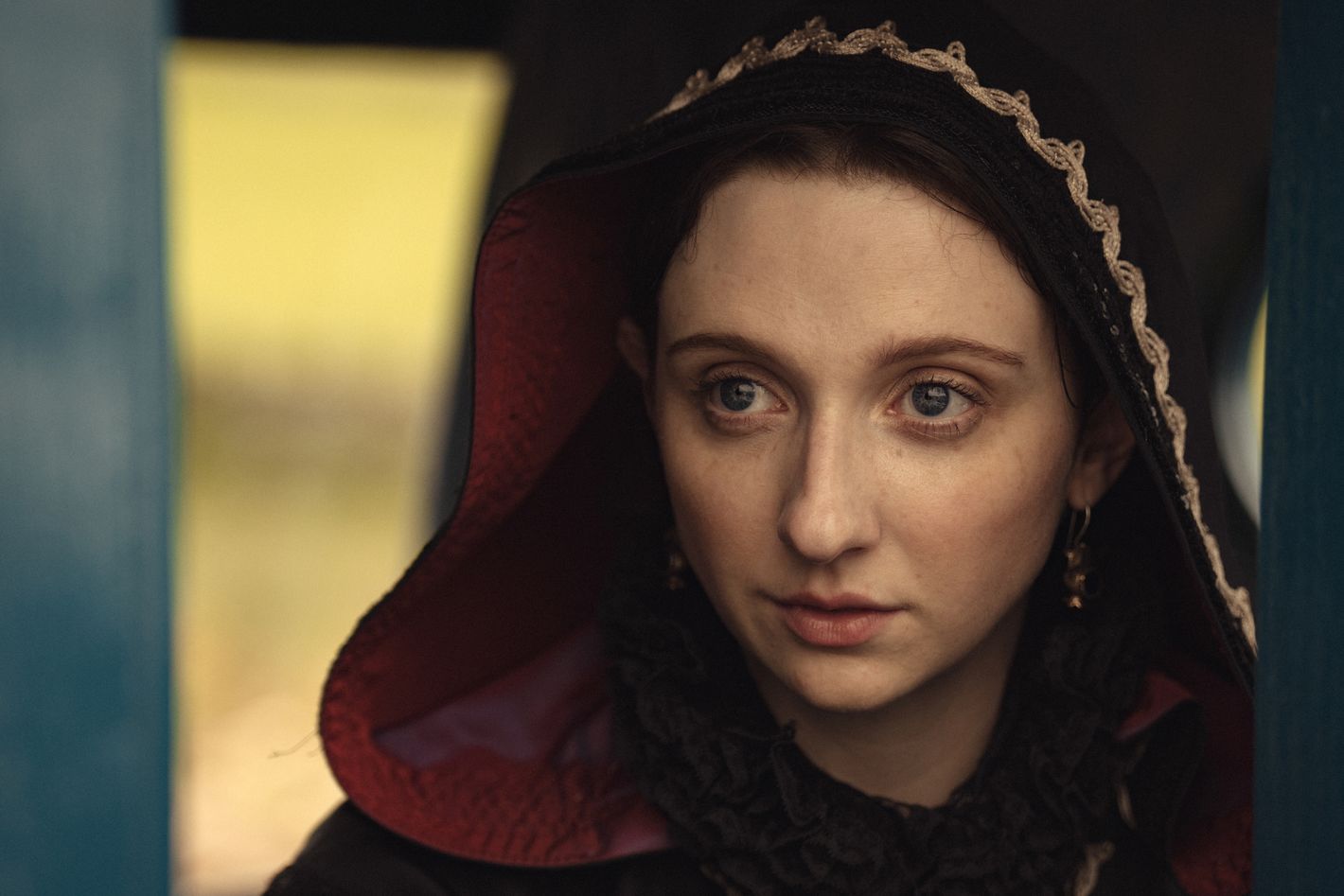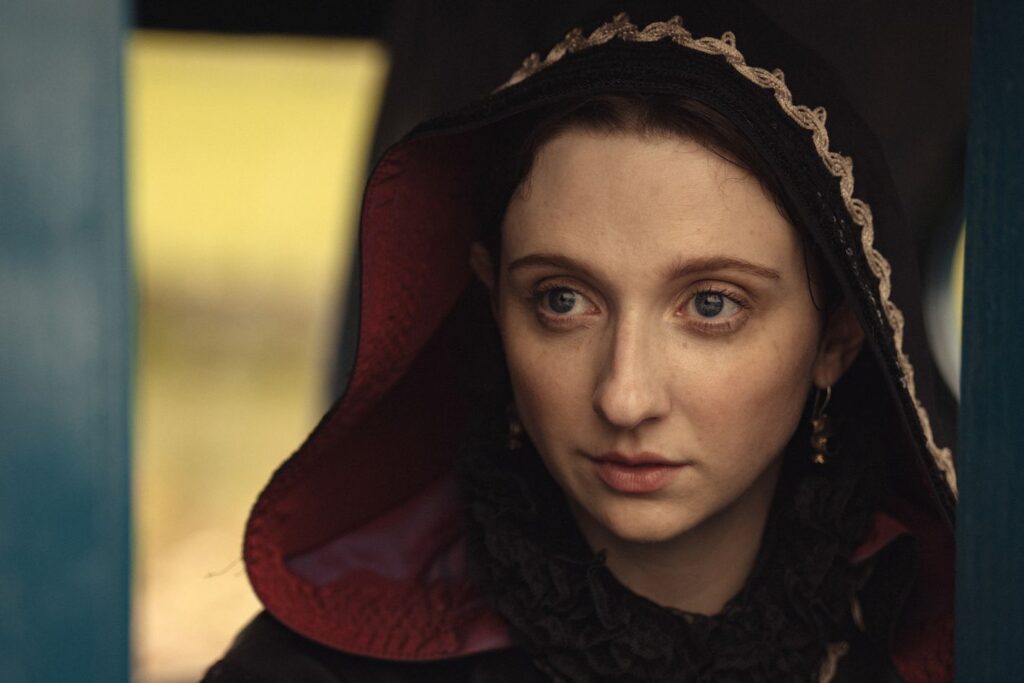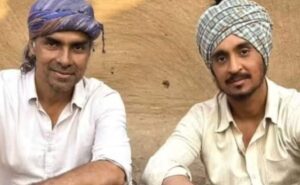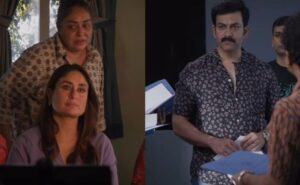
A little time has passed when we check in at the start of this third episode. Where House of Guinness’s first two outings squeezed a lot of action into a few dramatic days in May, this one picks up in August 1868, after Edward’s plans for the future of both the Guinness family and the company that bears their name have been allowed to spin for a few months. But even if some of Edward’s ideas have been adopted by both his siblings and the brewery, he unveils some even more ambitious plans in this episode — some of his own invention, others forced on him with a smile.
Before we get to that, however, the episode checks in with Anne, whose tour of Guinness properties throughout Ireland has brought her to County Galway, where the scenery is picturesque but the people look grim and act inhospitable. Her journey has brought her to Cloonboo, a town devastated by the Great Famine that ravaged the land between 1845 and 1852. Those who remain “didn’t starve to death or go to Boston,” Anne’s driver tells her before bringing in a pair of bodyguards to protect her from anyone who might get ideas about taking out their wrath on a member of one of Ireland’s most famous and wealthiest families. Like most who live in Cloonboo, they don’t speak English. Fortunately for Anne, at least one Cloonbooian does.
As the carriage pulls into the town square, Anne demands they make an unexpected stop to visit with a doctor. After being told there are no doctors in town, she asks to at least see a woman, and the right woman soon arrives in the form of Sultan (Hilda Fay, dropping in to deliver a heartbreaking performance), who immediately sees that Anne’s having a miscarriage — she didn’t even know she was pregnant — and takes her to the church to recover. When she awakens, she considers the religious implications of her experience. Maybe she’s being punished for her sin? Maybe God’s telling her that she needs to help the people of Cloonboo. She promises Sultan to return when she’s finished with her business at Ashford Castle, a promise that Sultan doesn’t take very seriously. Nothing in her experience has led her to believe she should put much stock in the promises of wealthy outsiders.
Back in Dublin, the Guinness home gets a visitor that Potter will later describe to a nude Arthur as “sharp.” Olivia Charlotte Charlotte Hedges-White (Danielle Galligan) enters while complaining about, well, everything: the size of the Guinnesses’ house, their servants’ reputation for gossip, even the fact that they brew beer. (How déclassé.) She’s here to interview for the position of Arthur’s wife and, frankly, she doesn’t seem that interested in the position. However, that soon changes when she gains a sense of her duties and benefits. After announcing that she values honesty above all else and sending the servants away, a behavior that appalls Aunt Agnes but intrigues Arthur.
Also intriguing: that Olivia understands exactly what they’re looking for in arranging un mariage blanc. She’ll take his name but not be “obliged” to sleep with him. She can sleep with others, however, so long as she’s discreet. And so, naturally, can Arthur. That Olivia gets it helps increase her appeal to Arthur, as does the way she favors “telling the truth out loud.” He’s not in love with her, for obvious reasons, but he does like her. You could even say that he’s a little smitten, in a platonic way. “Burn the list,” he tells Agnes before they launch into plans for his political career and all the trips they can take together and settle on her annual allowance. It’s not a case of true love prevailing, but it does appear as if their bond could be just as deep, in its own way.
So what’s Edward up to while all this unfolds? He’s trying to have a quiet day at the office, but the arrival of a stranger named Byron Hedges (Jack Gleeson, best known for Game of Thrones) puts those plans to rest. Byron is there to offer his services with Guinness’s plans to expand to the United States. And, since he’s Edward’s cousin by way of a relative’s affair with a Fenian, Byron feels Edward ought to be especially open to his sales pitch. What’s more, Byron’s ready to go — he’s got his passport, he’s booked travel, and he’s got a place to stay with a fellow member of the Fenian Brotherhood in the States. He also knows that Guinness will need the support of the Brotherhood to make it in America. So why not work with a member of the family?
Elsewhere in town, Ellen does not realize that her path will soon cross that of the Guinness family’s when she’s arrested for leading a peaceful protest in front of Dublin’s General Post Office (a building destined to play a central part in the Easter Rising of 1916), inspired by the hanging of Michael Barrett. In jail, sorry, gaol, Ellen is greeted by Rafferty, who’s there to deliver an invitation (not the last she’ll receive this episode): Edward would like to have tea, cake, and a conversation with her this Friday afternoon. Ellen is not receptive to this, to say the least, but Rafferty essentially bullies her into at least hearing Edward out by saying that if he had his way, he’d have her locked up, so maybe she should appreciate this new era’s attempt at a new approach. With £5 in her hands to buy a proper dress, she agrees to show up.
As the day approaches, Edward makes some pretty big moves, telling Rafferty to pin up an announcement that workers who age out of working for Guinness will receive money anyway. It’s something called a “pension.” What’s more, Edward’s also dreamed up something called the Guinness Workers’ Health and Benefits Scheme. Is he implementing these policies out of the goodness of his heart? That might be part of his rationale. He certainly doesn’t seem to mind the admiration of his workers. However, Edward also knows that with more working men being able to vote, and with Guinness workers representing a significant voting bloc, all this goodwill will only help Arthur in the upcoming election.
Benjamin is dealing with his own personal drama. Christine still believes in him and wants to marry him. She’d also like to take him to London, where a doctor can help him quit drinking. Benjamin appreciates her concern and seems to return her love. But he’s already made other plans. He’s going to prove his father’s lack of faith in him wrong by starting over in the military, where his name should allow him to advance to the rank of captain. Christine does not take this news well, but Benjamin seems committed to the plan, at least for the moment.
To Sultan’s surprise, Anne makes her return to Cloonboo where she hears all about life during the Famine. Sultan spares none of the gruesome details, from the husband and children she lost to her memories of the village being so hungry they resorted to eating the seed they were given to plant to the evictions that put her, and many others, out in the streets. This has a visible effect on Anne even before she tells Sultan she plans to help her and the other residents of Cloonboo. She’s committed enough to put her plans in a letter to her brothers, complete with the proposal that 10 percent of Guinness’s profits go to help the “deserving poor.”
Arthur sees no future in this. But Edward gets it. And as with his progressive ideas about benefits for workers, he understands that this generosity can be used to advance the family’s political ambitions while burnishing the company’s reputation. But wait, there’s more: Edward’s also moved on his plans to bring Guinness to America by taking Byron up on his offer. Benevolence leads to votes, leads to power, leads to expansion, leads to profits. Oh, and one more thing: Eddie wants to share Guinness’s new symbol, the harp of Brian Boru.
To put it mildly, Arthur only agrees reluctantly. He’s a conservative Protestant. He can’t be in bed with the Brotherhood, even indirectly. And he can’t nod to Ireland’s Celtic and Catholic elements by using a harp. But, as Edward points out, he also doesn’t have a lot of choice if he wants to keep his secrets under wraps. When Arthur asks him to say “aye” to agree to the harp, he says “aye.” With its swelling music and dramatic editing, the moment feels a little overwrought, but the same could be said for the whole series. That also seems to be by design. As House of Guinness has progressed, it’s gotten more conspicuously interested in exploring the historical issues at play than its first episode suggested, and better able to fold them into the glossy melodrama of the Guinness siblings’ stories. Being a little overwrought largely works for this show, even if it occasionally seems to be ratcheting up the drama for effect.
Finally, it’s time for Edward and Ellen’s lunch at a fancy establishment that attempts to turn her away by asking her to come in via the servants’ entrance. Ellen might have successfully dressed for the occasion, but she has something of a reputation in Dublin. Though Ellen tells him she doesn’t drink during the day, Edward uses two bottles of Guinness to offer an object lesson: Just as the proper way to pour a Guinness involves giving the beer a chance to “calm down” at the halfway point, Ireland needs a chance to “reflect” before the dreams of independence Ellen and the other Fenians have introduced can move forward successfully. Ellen might want to strong-arm the Guinness family by threatening to reveal Arthur’s secret life, but wouldn’t it be nicer if they were friends? And, hey, maybe Ellen and her brother would like to come to Arthur’s wedding? That might kick things off well. With that invitation, Ellen decides to toss back the Guinness she’s been offered and leaves with plans to attend the wedding.
House of Guinness has been compelling from the start but kicks into a higher gear with this episode. Anne’s trip to the countryside opens up the series both physically and thematically by acknowledging that Irish life and history exist outside Dublin and that while the Guinness family amasses power and plays at politics, others are living a much different existence. Gleeson’s arrival brings another jolt of energy. Byron is charming and a little dangerous, making him a fun counterweight to Edward’s brooding and planning.
Sláinte!
• A bit more about Arthur. House of Guinness’s depiction of both his sexuality and his marriage does not contradict any facts we know about Arthur. In Joe Joyce’s 2009 book The Guinnesses: The Untold Story of Ireland’s Most Successful Family, the author confirms he had a marriage arranged as a mariage blanc, meaning there would be no sex, and implying strongly that Sir Arthur was gay. The couple was also childless. Beyond that, we don’t really know. They remained together until Arthur’s death in 1915. Olivia died ten years later. (Sorry if those count as spoilers.) By contrast, Joyce is much more confident in asserting that Arthur’s uncle, Arthur Lee Guinness (lots of Arthurs in this family), had an affair with Dion Boucicault when the future playwright was working at the Guinness brewery as a clerk.
• As noted in the recap of the premiere, Michael Barrett’s execution coincided with the elder Benjamin Guinness’s funeral, so the series is playing a little loose with the timeline (but not that loose).
• Brian Boru’s harp is a real instrument; one can see it in person if you visit Trinity College. It did not actually belong to Brian Boru, the 11th-century High King of Ireland, since it only dates back to the 14th or 15th century. Still, it’s the oldest harp in Ireland, a symbol of Irish culture that’s served as a symbol of the country since the establishment of the Irish Free State in 1922. However, in this context, it faces left because the Guinness family has copyrighted the right-facing harp.
• The previous episode ended with a song from the Mary Wallopers. This one drops one near the beginning, “As I Roved Out” from the 2019 EP A Mouthful of the Mary Wallopers. As Anne contemplates the sad history of Cloonboo and her own recent troubles, Irish singer Lisa O’Neill’s heartbreaking “Goodnight World” fills the soundtrack. You can find that on her 2023 album, All of This Is Chance. The credits roll accompanied by the Scratch’s 2022 single “Another Round.”
Arthur finds a wife to help his political career, but his secrets are still going to be a problem.

































































